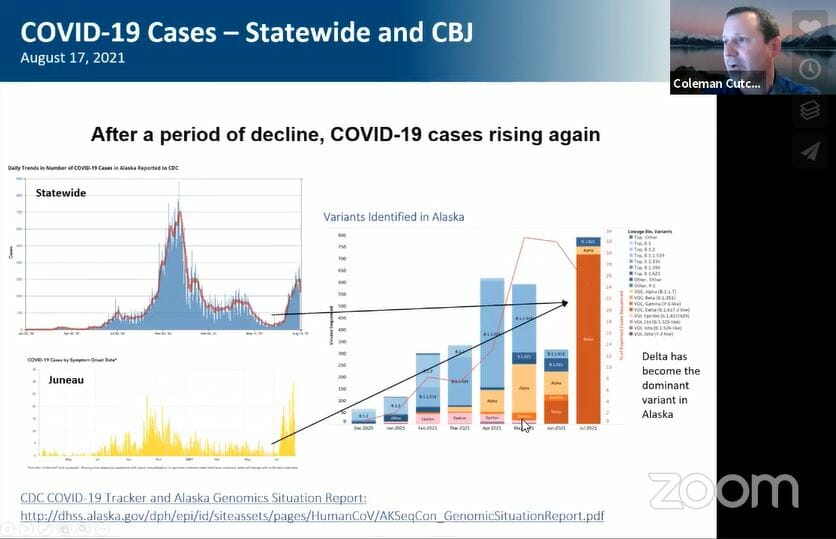
Recap of Aug. 17 COVID-19 Community Update
Thank you to everyone who tuned in to Tuesday’s COVID-19 Community Update. In case you missed it, staff with the Alaska Department of Health and Social Services (DHSS) joined members of the City and Borough of Juneau’s Emergency Operations Center to give a presentation and help answer questions from the community. Below are some answers and resources that were provided during the update. Watch the whole update here.
What’s the point of getting vaccinated?
State Epidemiologist Dr. Joe McLaughlin: “With respect to the MRNA vaccines, we know the scientific data that have come up indicate that they are still highly effective against the Delta variant. Probably at least in the mid to high 80 percentage range based on scientific data. They are much more effective still at preventing hospitalization or death – probably in the low to mid 90 percentage range at preventing hospitalization and death if you have a breakthrough infection.”
Dr. McLaughlin painted this picture: Imagine 100 people in a room who are fully vaccinated. If everyone in that room was exposed to the virus, about 12-15 people are expected to develop COVID-19. Compare that to a room of 100 people who are unvaccinated. If everyone in that room was exposed to the virus, each of them is expected to get the virus and most will develop symptoms.
“If you get the vaccine, you are highly protected – it’s not perfect, but you’re highly protected against not only SARS-CoV-2 infection and COVID illness, but also hospitalization and death. If you’re not vaccinated or had prior immunity from prior infection, you’re completely susceptible. That’s the big reason why getting vaccinated is so important; it decreases cases and it decreases hospitalizations and death.”
Dr. McLaughlin also referenced this CDC article that shows what we can expect in terms of benefits and harms for every million doses of vaccines that are administered:
If you’ve already had COVID-19, what are your chances of getting a reinfection if you’re vaccinated versus if you’re not vaccinated?
A recent CDC study of hundreds of Kentucky residents with previous COVID-19 infections showed this: People who did not receive COVID-19 vaccine after their COVID-19 infection had more than twice the likelihood of getting COVID-19 again compared to those who were fully vaccinated. People who have had COVID-19 should get vaccinated to prevent getting COVID-19 again. Read the study.
What do we know about Long COVID?
State Epidemiologist Dr. Joe McLaughlin: “Long COVID can be very debilitating for people. If you don’t get COVID, if you don’t get infected with the virus, you’re not going to get long COVID. What is the best way to prevent getting infected with the virus? The very best tool we have is vaccination. For people who choose not to get vaccinated, what they’re looking at is a very, very high likelihood that they will ultimately get infected with the virus given the degree of transmission that’s happening.”
Dr. McLaughlin referenced this recent article from The Journal of the American Medical Association about the increased risk for stroke among young healthy males who had asymptomatic infection.
On protecting kids against COVID-19
DHSS Staff Physician Dr. Lisa Rabinowitz: “Increasing vaccination rates in the whole community is going to help those kids that can’t be vaccinated at this time.”
State Epidemiologist Dr. Joe McLaughlin: “We can [protect our young] by vaccination. And in areas where you’ve got high transmission, other non-pharmaceutical mitigations help as well – masking, social distancing, avoiding crowds, keeping your bubble small.”
On COVID-19 safety in schools
State Pharmacist Dr. Coleman Cutchins: “The CDC and the American College of Pediatricians both put out guidance in the last few weeks. Both have a common theme – children benefit from in-person learning, and we should be doing all we can to keep schools open and kids in school. Both guidance say high vaccine rates are the way out of the pandemic. Universal masking, regular screening testing, distancing, contract tracing, staying home when sick – all tools to keep kids in school and schools safe.”
The Alaska Department of Health and Social Services holds an ECHO videoconference on School Health every Monday 3:30 – 4:30 p.m. See the full ECHO schedule here.
Read CDC school guidance.
Read Juneau School District’s COVID mitigation plan here.
On COVID-19 safety at large group events
State Epidemiologist Dr. Joe McLaughlin: “What we know about this virus is that it transmits from human to human when people are in close contact with each other. And we know the transmission rate is much, much higher when it’s indoors compared to outdoors, but still it can happen in outdoor settings, especially if you’re in close proximity with somebody who is infected and you’re susceptible. A way to decrease your risk is to avoid crowds, wear a mask, and then when you’re in settings when there are other people around, social distancing. Those are all things we know that will work. People who are at high risk for SARS-CoV-2 infection and people who are unvaccinated – if you go into crowded situations, those are going to be higher risk situations for transmission.”
Two out-of-town vaccinated friends stayed in our home for four days, leaving last Sunday. They tested negative when they arrived in Juneau. My husband and I were tested when they left – got negative results. Should we be re-tested and, if so, after how long?
CBJ EOC Section Planning Chief Robert Barr: “If your friends were not symptomatic and have not become symptomatic, you don’t need to re-test unless you begin to experience symptoms or unless you are (separately) identified as a close contact to someone who tested positive.”
